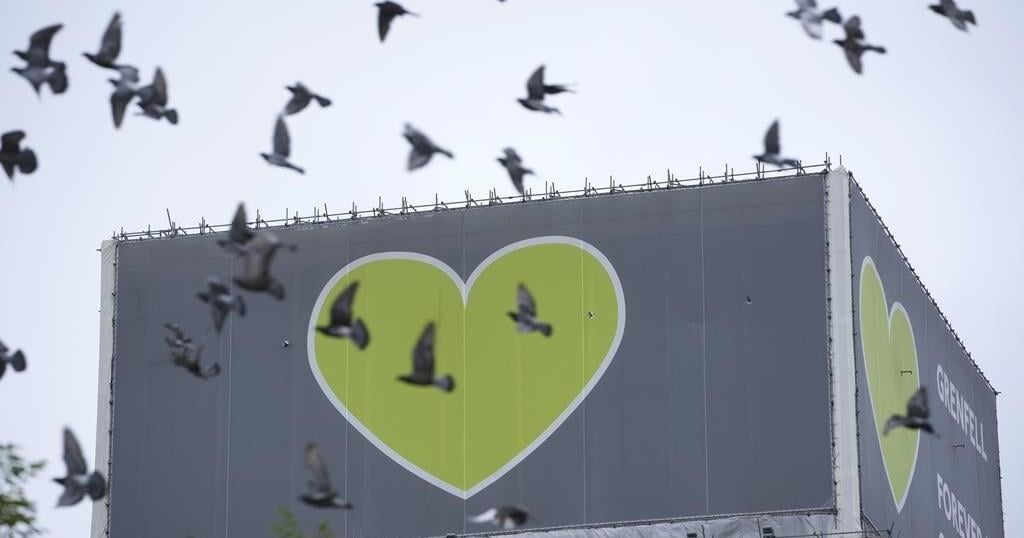LONDON (AP) — A damning report on a deadly London high-rise fire says decades of failures by government, regulators and industry turned Grenfell Tower into a “death trap” where 72 people lost their lives.
The years-long public inquiry into the 2017 blaze, the deadliest fire on British soil since World War II, concluded that there was no “single cause” of the tragedy. It said residents were let down by dishonest companies, weak or incompetent regulators and complacent government.
It said “many failings of a wide range of institutions, entities and individuals” led to the fire.
THIS IS A BREAKING NEWS UPDATE. AP’s earlier story follows below.
LONDON (AP) —
Seven years after a fire in a London high-rise building killed 72 people, an exhaustive public inquiry is set to report on the lapses and mistakes that turned a small fire in an apartment kitchen into the deadliest blaze on British soil since World War II.
Inquiry chairperson Martin Moore-Bick, a retired judge, is to deliver the findings Wednesday from a six-year investigation that examined how building flaws, lax enforcement of safety standards and mistakes by emergency responders contributed to the shocking death toll in the Grenfell Tower blaze.
The final report may give survivors some of the answers they have long sought — though not prosecutions for those responsible. Criminal charges are on hold until after the inquiry concludes.
Sandra Ruiz, whose 12-year-old niece, Jessica Urbano Ramirez, died in the fire, said that “for me, there’s no justice without people going behind bars.”
“Our lives were shattered on that night. People need to be held accountable,” she said. “People who have made decisions putting profit above people’s safety need to be behind bars.”
The fire broke out in the early hours of June 14, 2017, in a fourth-floor apartment and spread up the 25-story building like a lit fuse, fueled by flammable cladding panels on the tower’s exterior walls.
The tragedy horrified the nation and raised questions about lax safety regulations and other failings by officials and businesses that contributed to so many deaths.
It also prompted soul-searching about inequality in Britain. Grenfell was a public housing building set in one of London’s richest neighborhoods — a stones’ throw from the pricey boutiques and elegant houses of Notting Hill — and many victims were working-class people with immigrant roots. The victims came from 23 countries and included taxi drivers and architects, a poet, an acclaimed young artist, retirees and 18 children.
The inquiry, announced by the government the morning after the blaze, has held more than 300 public hearings and examined around 1,600 witness statements.
An initial report published in 2019, looking at what happened the night of the fire, criticized the fire department for telling residents to stay in their apartments and await rescue. The advice was changed almost two hours after the fire broke out, too late for many on the upper floors to escape.
Moore-Bick said the final report Wednesday would examine the “decisions which led to the installation of a highly combustible cladding system on a high-rise residential building.”
Grenfell Tower had been covered during a refurbishment with aluminum and polyethylene cladding — a layer of foam insulation topped by two sheets of aluminum sandwiched around a layer of polyethylene, a combustible plastic polymer that melts and drips on exposure to heat.
In the wake of the fire, the U.K. government banned metal composite cladding panels for all new buildings and ordered similar combustible cladding to be removed from hundreds of tower blocks across the country. But it’s an expensive job and the work hasn’t been carried out on some apartment buildings because of wrangling over who should pay.
The lead lawyer to the inquiry, Richard Millett, has said organizations, including the companies that made the cladding, the contractor in charge of refurbishing the building and the local government, had engaged in a “merry-go-round of buck-passing” as they sought to blame others for the fire.
The ruined tower, which stood for months after the fire like a black tombstone on the west London skyline, still stands, now covered in white sheeting. A green heart and the words “Grenfell forever in our hearts” are emblazoned at the top.
Survivors and bereaved families worry the report may spread blame too widely to see anyone punished. Police are investigating dozens of individuals and companies and considering charges, including corporate and individual manslaughter. But they say any prosecutions must wait for the inquiry’s end and are unlikely to come before late 2026.
“We were denied justice for seven years and now told there will be several more years,” the Grenfell Next of Kin group said in a statement. “Our realistic concern is that the ‘web of blame’ presented through the Inquiry will be a barrier to our justice.”

























